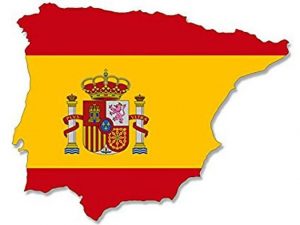Spain is a country with a rich gambling history, that has adapted and changed over time to offer safe, regulated betting options for players. The country has offered legal gambling for more than 30 years and has become notorious for its gambling culture. Between lotteries, casinos, and professional sports betting, Spaniards manage to wager a higher percentage of their income in comparison to almost any other nation in the world. Estimates suggest that the country spends more than €1.9 billion on gambling each year.
notorious for its gambling culture. Between lotteries, casinos, and professional sports betting, Spaniards manage to wager a higher percentage of their income in comparison to almost any other nation in the world. Estimates suggest that the country spends more than €1.9 billion on gambling each year.
For many years, the Spanish government took a very lax approach to gambling activities. This led to many land and online casinos operating under little or no regulations. Seeing the effects of such operations, the government stepped in to issue legislation to help license and regulate sports betting operators resulting safer gaming practices for players. These efforts have done much to help fuel a booming online sports betting industry throughout Spain.
History of Sports Betting in Spain
There are 17 regional governments that oversee the operation of brick-and-mortar gambling locations throughout Spain, while Madrid takes responsibility for national regulations. The Spanish government passed the first online gambling laws in 2006, which led to a steep increase in available gambling opportunities. At this time, sports betting became legal at licensed sports betting outlets, as well as online platforms. This opened the door for betting shops, often a collaboration between British companies like William Hill and a Spanish firm, to begin opening at the beginning of 2008. Partnerships like this typically opened a physical sportsbook, as well as providing online sports betting. The new laws inspired many businesses to join the budding industry, and betting locations, both physical and online, started to pop up in large numbers throughout Spain.
The laws passed in 2006 set the wheels in motion for more regulation in the coming years in the form of the 2011 Spanish Gambling Act. Under this act, a framework was developed under the regulating body of the Direccion General de Oredenacion del Juego (General Directorate for the Regulation of Gambling Activities). This regulating body was responsible for punishing unlicensed online betting sites and blocking access to these sites. This legislation provided clearer guidelines for the issuing of licenses and operation of brick-and-mortar and online gambling businesses. These regulations did much to help ensure the safety and satisfaction of players throughout the country.
Influence of Professional Soccer
Spain’s premier soccer league, La Liga, has had a massive impact on the gambling landscape in the country. The league is home to two of the most  famous soccer teams in the world: Real Madrid and Barcelona. Additionally, the Spanish national team has had its own impact, winning the 2010 World Cup, as well as the 2012 European Championship. Soccer has collectively attracted a global audience of millions of people, making it an enticing betting prospect and also a valuable source of advertising revenue for sportsbooks. Over the years, this has become largely evident, and the sports betting industry has grown accordingly.
famous soccer teams in the world: Real Madrid and Barcelona. Additionally, the Spanish national team has had its own impact, winning the 2010 World Cup, as well as the 2012 European Championship. Soccer has collectively attracted a global audience of millions of people, making it an enticing betting prospect and also a valuable source of advertising revenue for sportsbooks. Over the years, this has become largely evident, and the sports betting industry has grown accordingly.
The growth of sports betting over the years has inspired industry leaders like Bet365, BWIN, 888sport, and other companies to strike up lucrative sponsorships and advertising deals with teams and professional leagues. The details of such deals range from small partnerships, to large advertising campaigns, including jersey advertisements. The timing of the Spanish World Cup win could not possibly have come at a more appropriate time in relation to the Spanish sports betting landscape, as the 2010 World Cup win happened a few months before the 2011 Spanish Gambling Act.
Where to Bet on Sports in Spain
Bettors throughout Spain will have no problem finding a spot to place their sports wagers. Sports betting is available at physical locations, in the form of brick-and-mortar casinos, as well as betting shops and sports betting cafes. The growth of gambling laws throughout the country has also helped online sportsbooks grow to be one of the largest gambling sectors in the nation.
Under the regulations of the 2011 Spanish Gambling Act, Spanish online sportsbooks are required to have a .es domain. This change ensures that any site operating under this domain is doing so with a license issued by the National Gambling Commission in Spain. These measures make it easy for bettors to identify legitimate sports betting sites, while also ensuring the safety of the players. Under these regulations, global sports betting brands have worked to secure their licenses in Spain, to offer some of the most enticing sports betting options. The following is a list of the most popular online sportsbooks in Spain:
-Bet365 Spanish Online Sportsbook
-Betfair Spanish Online Sportsbook
-Betway Spanish Online Sportsbook
-BWIN Spanish Online Sportsbook
-William Hill Spanish Online Sportsbook
-Suertia Spanish Online Sportsbook
-888sport Spanish Online Sportsbook
-Betsson Spanish Online Sportsbook
-LeoVegas Spanish Online Sportsbook
Types of Sports Betting in Spain
Given their substantial history with sports betting, Spain offers a wide variety of available bets through their many online sportsbooks. Spanish sportsbooks cover many different competitions and sports throughout the world and include many types of bets within each contest. Bettors will be happy to know that most Spanish sportsbooks also offer an impressive selection of live betting for contests that have already begun.
While available wagers vary from site to site, most Spanish online sportsbooks offer lines for just about any sport you can imagine. For example, Bwin has available wagers for popular markets such as soccer, basketball, and American football, while they also offer lines for less popular sports like darts and snooker. These are just a few of the sports available through Bwin’s online sportsbook, and other popular sportsbooks offer more of the same, giving players access to betting for all of their favorite contests.
Spanish sportsbooks can offer 50 or more wagers for a single competition, including moneyline bets, total score, prop bets, and much more. If there is a sports wager that you want to make, chances are you will have no problem finding somewhere to place that bet through a Spanish online sportsbook.
It should come as no surprise to bettors that Spanish online sportsbooks prioritize their most popular sport: Soccer. As mentioned above, the influence of La Liga and the Spanish international team is perhaps one of the most significant in the country’s history of sports betting. For that reason, available wagers on soccer are typically listed front and center at Spanish online sportsbooks. Similarly, players will notice other popular European competitions listed before their American counterparts. For example, many Spanish sportsbooks list volleyball or European basketball before NFL or NBA. Many of these sportsbooks offer lines for American competitions, but they do not take center stage.
Who Can Bet on Sports in Spain?
Online sports betting in Spain is very clearly legal and accessible to citizens throughout the country. In order to place an online wager in Spain, you must be 18 years old and you must be placing wagers through a betting operator that has received a license from the Direccion General de Oredenacion del Juego. Anyone placing bets at online sportsbooks that are not licensed, those that do not have the .es domain, will be breaking the law. The .es domain essentially eliminates any confusion about what constitutes a legal gambling site in the country.
Anyone who is 18 or older can easily create an account with any of the licensed online sportsbooks. In order to do so, players must provide some personal information, including their Documento Nacional de Identidad (DNI) number. This is essentially the equivalent to American sportsbooks asking players to provide their social security number or state identification card. In some instances, Spanish online sportsbooks may require players to provide a photo of their DNI to confirm their identity.
Mobile Sports Betting in Spain
For players’ convenience, many Spanish online sportsbooks offer mobile apps for both iOS and Android devices. This makes it easy for players to access their accounts on the go and place bets remotely. In order to place wagers through Spanish online sportsbooks, players must be located within the country; for that reason, players often must have location services enabled whenever they are placing bets. In most cases, users downloading one of these apps for iOS devices can do so through Apple’s App Store. However, with Android devices, bettors must access the appropriate site via their mobile device’s web browser and download the app from there. This is fairly common, as Google Play Store does not allow any real money betting apps. Some popular Spanish online sportsbooks do require iOS users to download the app from their mobile web browser as well, so be sure to check when visiting the sportsbook of your choice.
Commonly Accepted Banking Methods
It’s worth noting that creating an account with Spanish online sportsbooks will almost always require players to link a legitimate bank account for transferring money. Additionally, the Euro (€) is the most commonly accepted currency at these online sportsbooks. With those things in mind, let’s take a look at some commonly offered banking methods at popular Spanish online sportsbooks.
The banking methods accepted for Spanish online sportsbooks vary slightly, but there are a number of common methods that are shared by the majority, if not all. Perhaps the simplest and most widely accepted banking method, credit or debit cards, give players quick access to depositing money into their account. Both Visa and Mastercard are the most commonly accepted. This method requires players to provide their card information to begin depositing money.
Other commonly accepted methods include e-wallets, such as Skrill or PayPal. Anyone who holds a Skrill or PayPal account that is linked to a legitimate bank account can provide their e-wallet account info to be linked with their online sportsbook account. From there, players can seamlessly deposit or withdraw to their sportsbook account. Other options for cashing out include check or wire transfer requests. In some cases, players may also be able to initiate online banking transfers through their bank.
Players can rest assured that their banking information is safe with any online sportsbook that uses the domain .es. These sportsbooks are required to adhere to the strictest standards of the law to ensure the safety of the players.